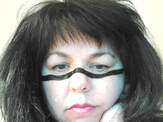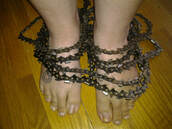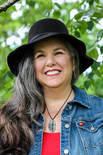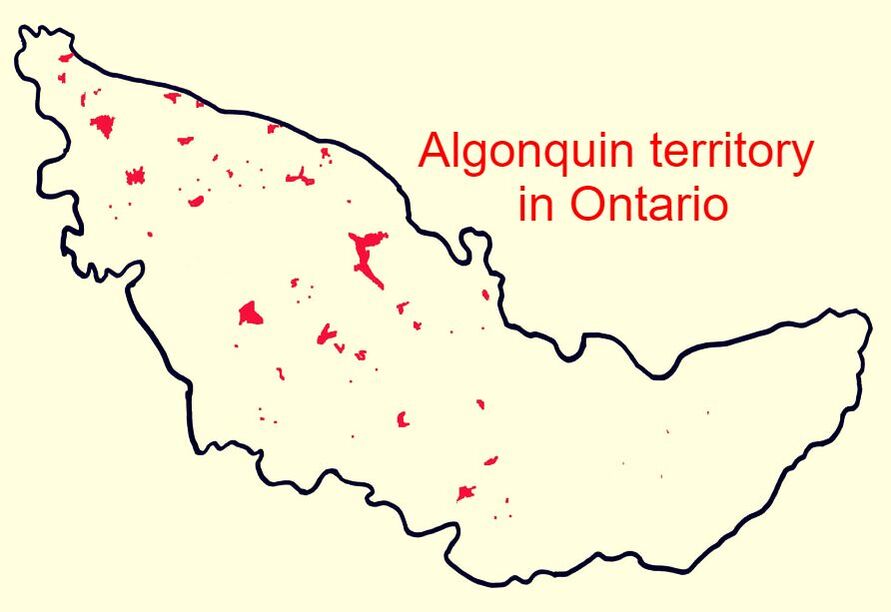 It is correct that the Indian Act is archaic and on its way out through the second-generation cut-off rule. It is correct that there are some members in First Nations that are not Indigenous such as the situation where non-Indigenous women married Indigenous men. Yes, many know about the history and future of the Indian Act. Algonquin Identity Appropriation There is a new epidemic that is causing all kinds of issues for the Algonquin: Indigenous identity appropriation. Many non-Indigenous people are claiming an Indigenous identity for the purpose of culture, exoticness, student funding, research funding, awards, and employment. This is not a small issue. It is huge. It is a colonial industry. Indigenous people are in need of the resources that are directed toward them. It is Indigenous people who need to direct and shape their futures through education and research that ultimately shapes policy and legislation such as health care and family services. Indigenous people do not need settler Canadians to do this for us and we do not need people usurping our identities, funding, and employment opportunities. Please stop. Non-Algonquin Claiming to be Algonquin Who are Pro-Land Claim The Algonquin living in Ontario are in a terrible situation where it is said that as many as 1,000 - 1,500 settler people are claiming to be Algonquin when they are not Algonquin. Some of these people are in very powerful positions making decisions about our settlement dollars, settlement dollar investments, and land choices and land selections. In actuality due to issues of root ancestors it is said that there are as many as 4,000 people enrolled in the Algonquin land claims that should not be. This is 50% of the enrollees. For the most part it seems that these people are pro-land claims possibly for the purposes already stated above, or for the purpose of gaining Indigenous rights. Sadly, because they are pro-land claim some Algonquin seem to take a soft position about their inclusion. Yet these people represent a tyranny over genuine Algonquin. Non-Algonquin Claiming to be Algonquin and Who are Anti-Land Claim There is also another group of settler people who are claiming to be Algonquin yet they too are not. These people are also taking up important space, funding, research direction, and academic employment opportunities from genuine Algonquin. When confronted many of these people argue that they are being challenged because they are anti-land claim. This is a complete obfuscation. No hegemony is ever that complete so much so that this can be correctly stated. In fact there are many genuine Algonquin who are anti-land claim and other genuine Algonquin who are pro-land claim. In making this argument these Algonquin identity appropriators obfuscate and confuse matters because they need to manipulate and shift the focus away from the real issue that they are claiming to be Algonquin when they are not. What makes this situation more difficult is that many of them are directors and professors making important decisions about funding and graduation, consequently they have many administrators, and students under their wings whose agency is pacified, controlled, or silenced. Many of us put down semma praying that this appropriation ends but it seems like the power of institutions are unable to address this because they are under the thumb of an oppressive all-encompassing economic paradigm. In Summary In sum, while the Indian Act has let in non-Indigenous people into our communities, there are people today who are actively appropriating Algonquin identity to first, become beneficiaries in the land claim and second, for funding and employment. It is important for people to pull all this apart and think deeply about the layers. People appropriating Algonquin identity are a huge concern and interference. Pikwàkanagàn’s First Nation members, inclusive of the non-status Algonquin, are unable to get to the real and many issues of the land claim. Genuine Algonquin people have a very legitimate concern as the last thing they need is another ‘settler tyranny of the majority’. Some people think the nation state likes this. This issue of identity appropriation is causing an incredible interference in the Ontario Algonquin land claim. The most vocal Algonquin are the ones who are able to pull it all apart and examine it for what it is: colonial genocide. We must stand behind and listen to the voices of the people who continue to remain strong. They are not ‘children of the state’ that must be pacified and controlled. Rather, they are descendants of a long tradition of warriors who taught them to protect their community. While the interference of the nation state via the Indian Act is a terrible history, the modern-day issue of Indigenous identity appropriation has reached an epidemic proportion. Lastly, Bob Lovelace does not speak for us. Author© Lynn Gehl, Ph.D. is an Algonquin Anishinaabe-Ikwe from the Ottawa River Valley. She is a member of Pikwàkanàgan First Nation She is a published author of Claiming Anishinaabe: Decolonizing the Human Spirit and The Truth that Wampum Tells: My Debwewin on the Algonquin Land Claims Process. Her most recent book is titled Gehl v Canada: Challenging Sex Discrimination in the Indian Act. You can reach her and see more of her work at www.lynngehl.com.
1 Comment
11/24/2020 0 Comments Land backAllow Indigenous people to lead the way; follow them Understand that being an ally / activism is not about doing what you like to do Do not mistake social activity as doing something for Indigenous people Understand that Indigenous needs are more than about your need entertainment Move beyond your need for an education; you becoming educated is not a legitimate ally / activist role Do something as we define our needs to be; not yours Don’t hold up our books like trophies; do something Understand the most important knowledge is practiced; do something Like Jean says, “shut up and listen”; yes, she said this Learn the difference between anti-colonial knowledge and Indigenous knowledge; value both Learn the difference between Elders’ knowledge and Indigenous intellectual knowledge; value both Serve the most oppressed; not who you want to serve or get off serving Do not project your shame and mistakes on Indigenous people; they are your issues Understand lateral violence and stop causing it; think deeply here Stop interfering with Indigenous people's relationships; such as the one between them and their Elders Indigenous Elders are not for you; get over it Stand behind Indigenous people; not in front Understand that saving the land and water is more than about an aesthetic for humans to enjoy Stop gossiping about Indigenous people; it is pitiful Value Indigenous people who have done the hard work to get an education and who stand up Stop Romanticizing Indigenous knowledge; resolve your issues with this Stop thinking smudging absolves you or stands in place of you doing something Dig into your pocket and give generously weekly, monthly, yearly Seek out and purchase from Indigenous artists and crafters Fundraise for someone who is working hard already; you can do this Serve Indigenous food banks in real ways – weekly, monthly, yearly Stop pretending to be naïve, we can see right through it and it is patronizing Stop talking about hope; it is not a plan; and it is patronizing End your false generosity, we can see right through it to and again it is patronizing Understand the depth of knowledge an intersectionally oppressed person carries; and respect it Stop assuming lawyers and historians understand an Indigenous framework; most do not Stop thinking Indigenous knowledge is only about how you feel; it is more than this Understand the greatest gift we have is our minds; this is fundamental to Indigenous knowledge End racism, sexism, and ableism Learn about genocide and the doctrine of discovery Give your Land Back through your last will and testament  © Lynn Gehl, Ph.D. is an Algonquin Anishinaabe-kwe from the Ottawa River Valley. She is a published author of Claiming Anishinaabe: Decolonizing the Human Spirit and The Truth that Wampum Tells: My Debwewin on the Algonquin Land Claims Process. You can reach her and see more of her work at www.lynngehl.com. All too often settler people say to me, “The Algonquin have to get it together and stop being so divided”. Although I am Algonquin Anishinaabe, a person does not have to be Algonquin to carry a critical thinking lens or framework in understanding that the issue with the denial of Algonquin rights, the destruction of our land, the pollution of the Ottawa River, and the destruction of our sacred places is in fact a settler issue and a settler government issue. It is not an Algonquin issue; not at all. It is not too difficult to reason that here in what has become the nation state called Canada, settlers have benefited from colonization in enormous and lucrative ways; in more ways than the Algonquin have. Through the construction of Canada settler people have had greater access to Indigenous land and settlers have benefited more from the resources mined and pilfered from the land. There are more settlers on Indigenous lands, and it is their settler government that continues to spend millions and millions of dollars to ensure the Algonquin remain in hardship, in poverty, and divided. Let’s face it, as long as the Algonquin remain divided Canada can, and will, blame us for the very divide Canada has manufactured ‒ again through the resources pilfered from Indigenous land. Through the settler court system, from the 1973 Calder decision through to the 2017 Tsilhoqot’in decision, Indigenous people have won the recognition for our rights yet Canada continues to deny these rights to us. Indigenous people have also placed their bodies on the land over and over and over again. It is about time settler people stop with the practice of blaming Algonquin people for the ongoing desecration and pollution of the land and water that we all need; trees and animals included. Said another way, the time is ripe for settlers to stop blaming Algonquin ancestors and fellow Algonquin who walk the earth today for what their ancestors did and their current settler government continues to do to the Four Orders of Creation. Too many so called friends and acquaintances continually say ignorant things to me over and over again about the Algonquin. They blame us. This has to stop. Settlers, you own this situation. It is time for you to put your bodies on the land and on the line. Mortgage your homes; sell you summer homes too; then there is the content of those homes, it can all go too. Really serve the cause. You can do this. Whatever steps you take to generate the change you seek and the change we all need, stop with the excuse of blaming on the Algonquin for the continued pilfering of the land that you mostly benefit from. Settlers stop externalizing your responsibility. Settlers, you own this; not the Algonquin Anishinaabeg.  Lynn Gehl, Ph.D. is an Algonquin Anishinaabe-kwe from the Ottawa River Valley. In 2017 she won an Ontario Court of Appeal case on sex discrimination in The Indian Act, and is an outspoken critic of the Algonquin land claims process. Recently she published Claiming Anishinaabe: Decolonizing the Human Spirit. You can reach her through, and see more of her work, at www.lynngehl.com 1/14/2018 0 Comments Why Settlers Rely on Nasty NamesMany Layers of Structural Oppression The knowledge of living as a structurally oppressed person is foremost held within the everyday lived experiences of the oppressed. The location of the knowledge of oppression resides within the bodies and hearts of the very people. As such, the wisdom needed to remedy structural oppression is located within the critical thinking minds of the oppressed themselves. Not all structurally oppressed people are able to move the knowledge from their bodies and hearts to the location of their minds. Remember that critical thinking is a gift and a skill. Most people know we live in a society that oppresses women. Few people will deny this. But we need to keep in mind that heterosexual, able-bodied, white women only experience one layer of structural oppression, and therefore only know one layer of the knowledge. Further, they lack the intersectional knowledge located within the spaces of having more than one layer of structural oppression. It can be said that the level of knowledge within the “Well of Wisdom”, needed to challenge oppressive structures that white women have, is not deep and murky. This sounds unkind but this is true. This is one reason why older white feminism was critiqued by women of colour. While white women were happy with the shifts made, women of colour were not ‘celebrating the continuation of the oppression’ as the shifts were mostly the assimilation of white women into patriarchal systems. Intersectional Feminism While white women do have some of the knowledge of structural oppression and the wisdom of how to address it, it stands to reason that women of colour will have more. What is more, women of colour will also have the intersectional effects of being both a woman and a woman of colour; where the experience of intersectional effects mean they also know the inter-acting results of experiencing two levels of structural oppression. What this means is the level of knowledge in the “Well of Wisdom” that women of colour hold to challenge oppressive societal structures is deeper and more murky than the level white women have. While women of colour know more than double the knowledge of structural oppression over white women, it stands to reason that women of colour with a disability embody even more of the knowledge and wisdom: more than three times the knowledge in that again they also hold the intersectional effects contained. We can keep adding to this. For example, a woman of colour with a disability and who is gender non-specific will even have more of the knowledge and wisdom needed to address structural oppression. In sum, the knowledge of structural oppression is located within the lived experiences of the oppressed where the multiply oppressed have more of the knowledge and wisdom needed to challenge it. My goal here is not to set up a knowledge competition but rather to illustrate why it is that people under more levels of oppression are able to identify the limitations of the less oppressed, that being white women. It is because they hold more of the knowledge. Cognitive Dissonance is Unpleasant All too often when white women take on a social justice issue, where they lack a deeper understanding of the knowledge of structural oppression, they are then faced with situations of cognitive dissonance when a person who is more oppressed speaks up letting them know they are not addressing issues in a way that the more oppressed need them to be addressed. Experiencing cognitive dissonance is emotional and the feelings that emerge are negative: embarrassment, shame, anger, hate, toxicity, lateral violence, arrogance, and ignorance. The good thing is the best learning is emotional; not nice though. What happens all too often when white women are informed or told about their ignorance they become reactionary so much so that they can and will rely on and hurl nasty adjectives to describe the person who was brave enough to speak up. Interestingly, I have come to know that the nasty adjectives actually best describe the less oppressed person’s emotional state brought on by their cognitive dissonance rather than the more oppressed brave person. The emotions are a result of them being challenged in ways they are ignorant about; or result from them being called out about their unspoken political agenda that further oppresses such as them supporting the current Minister of Status of Women Maryam Monsef who is not addressing sex discrimination in the Indian Act, the land claims process, and the destruction of sacred Indigenous land and waterscapes. On White Privilege; We Need White Women, But … While it is indeed a wonderful thing that white people are now learning about, reading about, thinking about, and talking about white privilege, white people do not have the everyday lived experience of being at the back end of white privilege where as such they do not hold the monopoly of knowledge on white privilege. It is crucial to keep in mind they do not and cannot ever hold the depth of knowledge and wisdom that people of colour hold on this topic. In short, because it is not their everyday lived misery they do not know it wholistically, deeply, or completely. Some people may be inclined to think, if white women do not hold enough of the knowledge of structural oppression, and if people who are more oppressed are not happy with the actions of white women, then they need to take a lead role in the process of challenging structural oppression and forget about white women. This line of thought is reactionary and not the thinking of a genuine social justice seeker, not at all. Asking white women to reflect on who has more of the knowledge is valid; it does not mean the more oppressed don’t need them in the struggle. Of course we do. What we need is for them to take a back seat or follow and serve the more oppressed. What is more, the less oppressed people who argue there is the need for the more oppressed to be nicer when they encounter settler ignorance really need to think critically about intersectional feminism, and stop burdening more oppressed people with settler emotions. I have produced a large volume of short reading materials that enhance the knowledge shared in this blog: Intersectional Oppression: https://journeymagazineptbo.com/2016/09/14/2830/ Follow the Turtle: https://www.lynngehl.com/follow-the-turtle.html Critical thinking and the Charity Model: www.lynngehl.com/black-face-blogging/critical-thinking-and-the-charity-model-of-social-justice Kawartha Truth and Reconciliation Support Group on Maryam Monsef: http://www.huffingtonpost.ca/lynn-gehl/canada-is-carrying-out-cultural-genocide-with-a-smile_a_23204482/ http://www.windspeaker.com/news/opinion/opinion-minister-monsef-disappoints-on-bill-s-3-and-continues-the-discrimination/ White Woman’s Gaze: https://www.lynngehl.com/black-face-blogging/that-white-womans-gaze On Nice People: https://www.lynngehl.com/black-face-blogging/nice-people-scare-me On Reconciliation: http://muskratmagazine.com/celebrating-canadas-150th-featuring-the-desecration-of-an-indigenous-sacred-place/  Lynn Gehl, Ph.D. is an Algonquin Anishinaabe-kwe from the Ottawa River Valley. In 2017 she won an Ontario Court of Appeal case on sex discrimination in The Indian Act, and is an outspoken critic of the Algonquin land claims process. Recently she published Claiming Anishinaabe: Decolonizing the Human Spirit. You can reach her through, and see more of her work, at www.lynngehl.com 1/20/2015 33 Comments That White Woman’s Gaze I had an experience that is telling in terms of a white woman’s interference in the relationship between Indigenous knowledge holders and Indigenous community members. I offer my story as it is illustrative of what many Indigenous women, Indigenous communities, and Indigenous organizations are contending with. It is worthy of noting here first, though, that this experience of mine happened within a very politically powered and gendered, and thus a very socially stratified, organization. White Woman Gaze Switching On this particular occasion I found myself in one of life’s special moments walking with an Indigenous elder and wisdom holder. Building relationships, I have come to know, sometimes take place in fleeting moments such as these. Walking side-by-side in the direction of the building we were heading toward, we exchanged small yet heartfelt pleasantries. As we entered the doorway and began to walk down the ramp deeper into the interior of the building a white woman was situated at the bottom of the ramp. This white woman looked at me and then at the elder and then back at me. My process of observing this woman looking back and forth was disturbingly telling. Through this process of observing her gaze-switching back and forth, I was able to observe how some white women look at Indigenous elders, in comparison to how they look at other Indigenous people such as me. As this white woman looked at me her face was pretty much neutral and not too expressive. Yet when her gaze shifted to look at the Indigenous elder her entire facial expression turned to one of juvenile happiness and joy. Again, when this white woman looked at me her face shifted to the more neutral expression. Then, as she once again shifted her gaze to look at the Indigenous elder, her facial expression once again shifted – again and again to one of childish adoration. By the time we made it to the bottom of the ramp, I had the opportunity to watch this cycle of her shifting gaze three times. How Her Gaze Switching Made Me Feel Although I knew this white woman, and I did have a somewhat friendly relationship with her, when we arrived at the bottom of the ramp, the Indigenous elder stopped to speak with this ever adoring fan. I, though, feeling ill, kept on walking. I was ill with disappointment because it was at that very moment that I realized I could never do for an Indigenous elder what this needful and pitiful white woman was able to do. Oh how I loathed this woman’s pitifulness, a pitifulness that any man would enjoy. As an Indigenous woman I have a right to, and need of, the Indigenous knowledge I seek. Indigenous communities are very much dependent on the emancipation of Indigenous women. The problem is that sometimes when we encounter elders we are unable to engage in the same pitiful childish adoring way that white women, and for that matter white men, are able to. And when our neutral facial expressions are compared to one such as this white woman’s expression, we are perceived as not deserving of the knowledge that may emerge. White Gaze of Interference When I think about my experience further, I recognize this white woman’s behaviour for what it is: an interference. Although there are many other reasons, a huge barrier in the transmission of Indigenous knowledge within Indigenous communities is what I call “white-woman-settler-gaze-of-interference”. This ramp experience with a white woman’s gaze was the moment when I realized how it is that white women are sometimes able to gain greater access to Indigenous knowledge than indigenous people. White women should not be impinging on the relationships that Indigenous knowledge holders have with Indigenous community members in this way. Indigenous people and Indigenous communities are dependent on the re-building of our nations and knowledge structures. Certainly, the white-woman-settler-gaze-of-interference should not be the mortar that solidifies and fortifies yet another inadequate patriarchy. Indigenous Women Are Vulnerable Enough In further thinking, I have also come to understand that within any organization where one resides at the lower end of the social stratification hierarchy, one is as vulnerable, if not more vulnerable, than the most vulnerable person. Clearly this white woman was needful and the problem is that through her pitifulness, she makes other people, such as myself, more pitiful as we are not able to compete in terms of offering juvenile adoration to an Indigenous knowledge holder. The Privilege of a White Woman’s Gaze Later I came to realize that in fact this white woman comes from a very privileged family and position in society. She has had, and continues to have, the love, support, and guidance of her parents, grew up in a home in a nice area of town, and thus had great access to economic resources. Regardless of her privileged position over Indigenous women this white woman is selfish. There is the Need to End the Selfishness of the White Woman’s Gaze White women, and white men, need to critically reflect on, and be cognizant of, their actions and respond in a way that assures they do not hurt Indigenous women and people in their emancipation efforts. In Indigenous women’s goal for emancipation we need genuine allies and collaborators, not women who interfere through their white-woman-settler-gaze-of-interference. Related Black Face Blogs: http://www.lynngehl.com/black-face-blogging/unhinging-settler-consciousness http://www.lynngehl.com/gehl-ally-bill-of-responsibilities.html http://www.lynngehl.com/black-face-blogging/on-indigenous-knowledge Feminist Wire article: http://thefeministwire.com/2013/04/clearing-the-path-for-the-turtle/ Lynn Gehl, Ph.D. is an Algonquin Anishinaabe-kwe from the Ottawa River Valley. She has a section 15 Charter challenge regarding the continued sex discrimination in The Indian Act, and is an outspoken critic of the Ontario Algonquin land claims and self-government process. She has three books: Anishinaabeg Stories: Featuring Petroglyphs, Petrographs, and Wampum Belts, The Truth that Wampum Tells: My Debwewin of the Algonquin Land Claims Process, and Mkadengwe: Sharing Canada's Colonial Process through Black Face Methodology. You can reach her at [email protected] and see more of her work at www.lynngehl.com.
|
|
To subscribe to Lynn's Blog: click here
To subscribe to Lynn's Newsletter: click here To follow Lynn on her Public Facebook Page: click here To subscribe to Lynn's YouTube channel: click here To book Lynn as a speaker: click here To contact Lynn/License her work: click here Copyright Dr. Lynn Gehl, 2024 All Rights Reserved
|

 RSS Feed
RSS Feed
